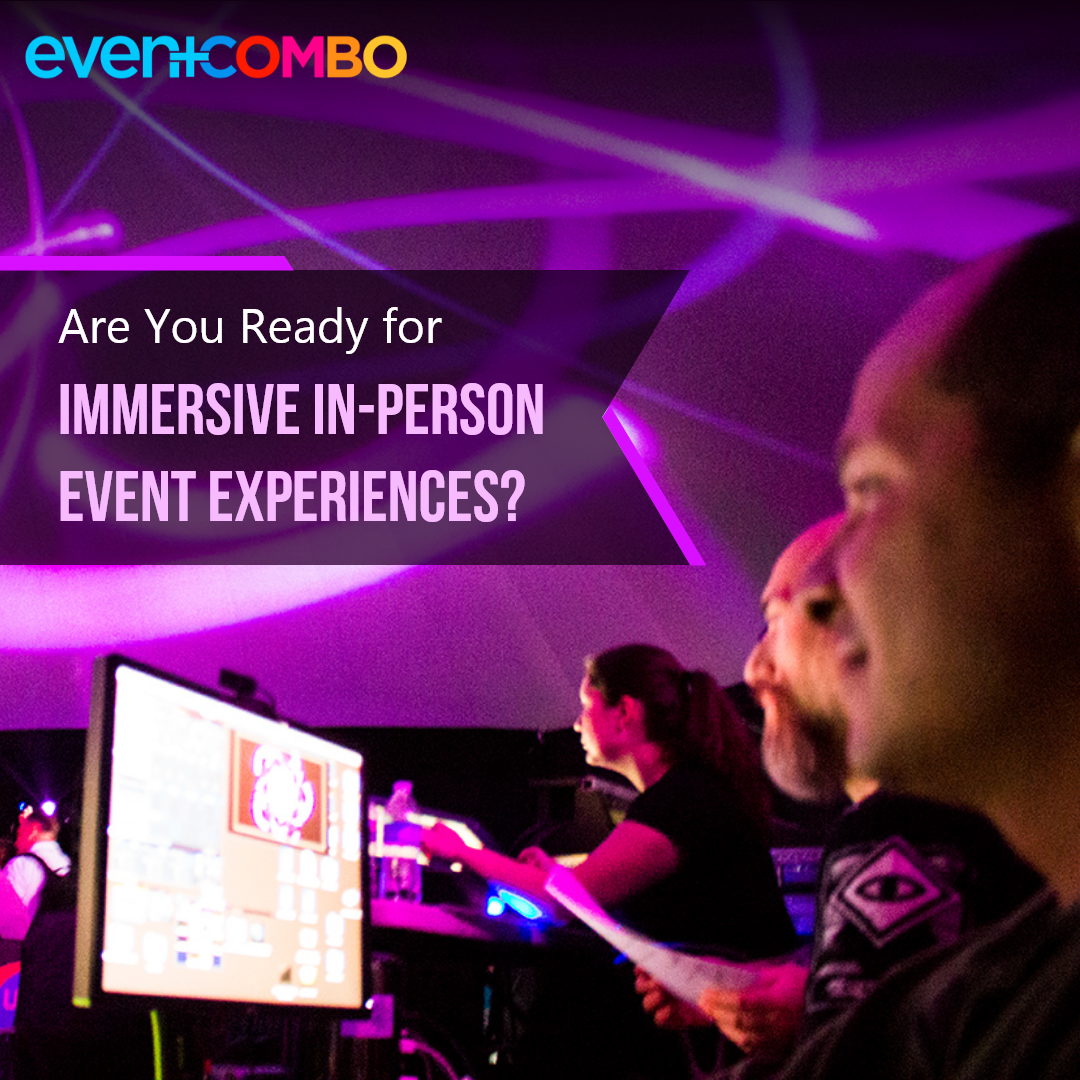How Augmented Reality and Virtual Reality are Transforming In-Person Events

May 19, 2023 Shruti Shah
Virtual reality (VR) and augmented reality (AR) are steadily making their way into every industry, revolutionizing them one step at a time. The event industry, particularly in-person events, is also undergoing a transformative shift due to AR/VR technology. In-person events have always been popular, and event professionals are working tirelessly to explore new possibilities and enhance the immersive, engaging, and valuable nature of these events for both attendees and organizers.
Virtual events and digital reality present their own set of challenges, but the fusion of humans and virtual reality demands much more than distributing VR headsets or providing 3D walkthroughs.
By seamlessly merging the physical and digital realms, the ongoing advancements in AR and VR technology within the events sphere are offering interactive and multi-dimensional experiences that captivate attendees and elevate events on a global scale.
How AR/VR is Transforming In-person Event Management
Nearly everyone has attended a concert, trade show, or exhibition, regardless of its size, even if it was a small event held in a convention hall. Have you noticed how the most popular booth always manages to stand out with innovative ways of displaying gadgets, food stalls, or games? Fast forward to 2023, and AR/VR is already disrupting in-person event strategies, which is equally exciting for us.
Let's explore how immersive innovations in digital realities are leading us toward a new era of in-person events.
- Enhanced Event Promotion and Branding:
Fascination is the key to keeping attendees engaged and leaving a lasting impact that stays with them even after the event ends. It serves as the most effective marketing channel to reach a broader audience. AR/VR technology has opened up exciting possibilities for event promotion and branding. By incorporating AR elements into promotional materials, event organizers can generate thrilling experiences and increase engagement. For example, a recent global music and art festival introduced an AR-powered mobile app that allowed users to scan event posters or flyers, triggering virtual content such as 3D animations, videos, and interactive games. This immersive experience created significant social media buzz, made a lasting impression on potential attendees, boosted brand recognition and event awareness, and ultimately increased ticket sales.
- Interactive Exhibition and Product Demonstrations:
One of the most impactful applications of AR/VR for event organizers lies in product demonstrations and showcases during live events. Attendees can visualize and explore virtual representations of products in situations where arranging physical samples on-site is challenging. By incorporating these technologies, exhibitors can leverage AR/VR to showcase products and services with captivating experiences that bring their offerings to life. This immersive experience allows for better product understanding and increased sales potential. For instance, in the automotive industry, manufacturers are using VR to enable visitors/attendees to experience virtual test drives of their latest models. In the fashion industry, AR is transforming the way people try on clothing and accessories by using AR-enabled mirrors. Shoppers can virtually try on outfits without physically changing clothes, facilitating effortless experimentation with different styles.
- Virtual Venue Tours and Event Planning:
Over the years, event planning and execution, especially for large-scale conferences, exhibitions, and trade shows, have undergone significant changes with the increased usage of AR/VR technology. Virtual venue tours enable event organizers and exhibitors to preview event spaces, experiment with various layouts, and plan logistics more efficiently. This virtual walkthrough offers a realistic understanding of the venue's size, layout, and potential challenges, streamlining the planning process. In a major tech conference held some time ago, exhibitors were introduced to VR venue tours so they could virtually explore the event venue, customize their booth designs, and experiment with different setups. Adopting digital reality not only saved time and costs associated with rectifying designs, setups, and traveling to the venue but also allowed for better utilization of exhibition space.
- Gamification and Audience Engagement:
AR/VR technology has already made its mark in the gaming realm. The concept of incorporating games into events is popularly known as event gamification. While quizzes, feedback, and contests have long been deployed at in-person events, the need to enhance attendee engagement and interaction has led to the inclusion of VR/AR-enabled gamified experiences. Participants can compete and embark on virtual quests in a parallel reality, fostering excitement and camaraderie. A recently organized AR-powered scavenger hunt at an event gained significant attention, where participants used their smartphones to find and capture virtual objects hidden throughout the event venue.
- Immersive Training and Education:
AR/VR has also had a profound impact on training and educational initiatives within in-person events. These technologies enable participants to engage in immersive learning experiences, fostering deeper understanding and knowledge retention. For example, in the medical field, VR/AR can be used to simulate surgical procedures. Surgeons can practice complex operations in a virtual environment, allowing them to refine their skills and reduce the risk of errors during actual surgeries. Similarly, this technology also enables medical students to observe surgeries from a first-person perspective, enhancing their learning and preparing them for real-world scenarios.
- Live Streaming and Remote Participation:
By incorporating live streaming and VR-enabled platforms, event organizers can extend their reach to a global audience, allowing individuals to experience events from the comfort of their homes. Remote participation opens new opportunities for networking, knowledge sharing, and collaboration. For instance, many film festival organizers offer virtual access to film screenings and Q&A sessions where attendees can use VR headsets to watch films and engage with filmmakers, creating an inclusive experience for those unable to attend physically.
By embracing these technologies, event organizers can create unforgettable experiences, engage attendees, and unlock new opportunities for growth and innovation. As we move forward, the seamless integration of the physical and digital worlds will continue to shape the future of in-person events like never before.
Make every event unforgettable - Try our free demo today - https://bit.ly/3BX2tUO




